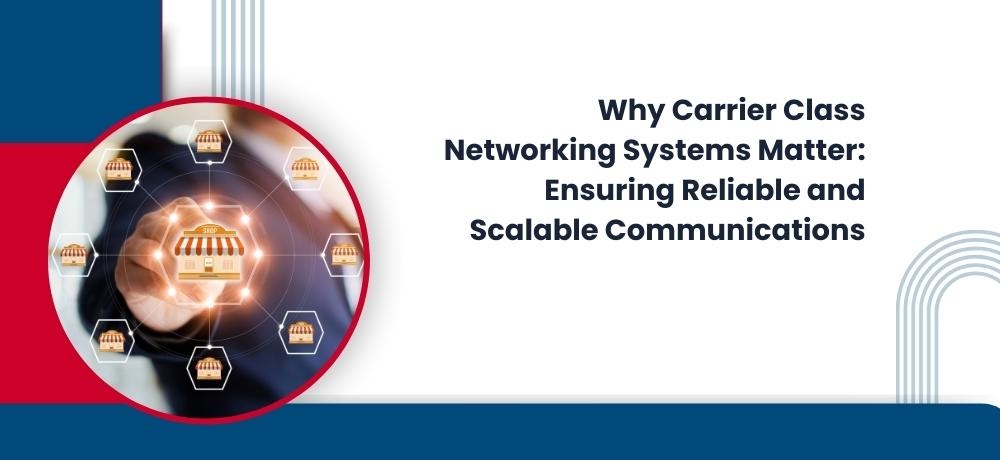
Why Carrier Class Networking Systems Matter: Ensuring Reliable and Scalable Communications
- Develcon
Categories: 3D Dashboard , 3D GIS , Access Control Systems , BEMS , BIM Toronto , Carrier Class Networking Products , Carrier Class Networking Solutions , Carrier Class Networking System Manufacturers , Carrier Class Networking System Manufacturing , Computer Networking Products , Computer Networking Solutions , Computer Networking System Manufacturers , Computer Networking System Manufacturing , DCIM , Frame Relay Switching , IP Routing , IP Video Camera Solutions , IP Video Surveillance Solutions , Legacy Networking , Network Hardware Design , Network Management Solutions , Network Management System , Network Software Design , Private Virtual Networking , Smart Solutions , Traffic Engineering , X.25 Switching
In today's interconnected world, where businesses rely heavily on communication networks, the importance of carrier-class networking systems cannot be overstated. Carrier-class networks are designed to deliver reliable, scalable, and high-performance communication services to meet the demands of carriers, service providers, and enterprises. These advanced systems play a crucial role in ensuring seamless connectivity and enabling the efficient delivery of data, voice, and video services. At Develcon, we strive to provide the best network hardware and software designed to deliver a better experience and dynamic, cost-effective results. In this blog post, we will discuss the benefits of networking system services.
Reliability
Carrier-class networking systems are built with high availability and fault-tolerant features to ensure uninterrupted connectivity. These systems incorporate redundant components, backup power supplies, and intelligent failover mechanisms to minimize service disruptions. By providing redundant paths and multiple points of connectivity, carrier-class networks can mitigate the impact of network failures or hardware malfunctions. This high level of reliability is critical for mission-critical applications, such as emergency services, financial transactions, and healthcare systems, where even a momentary loss of communication can have severe consequences.
Scalability
Carrier-class networking systems are designed to handle massive volumes of traffic and support the ever-increasing demand for bandwidth. These systems can scale horizontally by adding more network elements or vertically by increasing the capacity of existing components. Scalability is crucial in meeting the needs of growing businesses and accommodating the surge in data traffic driven by emerging technologies such as the Internet of Things (IoT), cloud computing, and streaming services. Carrier-class networks can handle the exponential growth of data and provide a seamless user experience without compromising performance.
Quality of Service
Carrier-class networks prioritize traffic based on the specific requirements of different applications and services. They employ advanced Quality of Service (QoS) mechanisms to allocate bandwidth and ensure that critical applications receive the necessary network resources for optimal performance. By prioritizing real-time traffic, such as voice and video communications, carrier-class networks minimize latency, packet loss, and jitter, resulting in improved call quality and video streaming experiences. QoS capabilities are vital for delivering reliable and high-quality services, especially in environments where multiple applications with varying bandwidth demands coexist.
Security
Carrier-class networking systems incorporate robust security features to protect sensitive data and prevent unauthorized access. These systems implement advanced encryption algorithms, authentication mechanisms, and access controls to ensure data privacy and integrity. Carrier-class networks also employ intrusion detection and prevention systems to identify and mitigate potential threats. With the increasing risk of cyberattacks and data breaches, security is a top priority in modern communication networks. Carrier-class systems provide the necessary safeguards to protect critical information and maintain the trust of users.
Management and Control
Carrier-class networks offer centralized management and control capabilities, allowing administrators to monitor and configure the network infrastructure efficiently. These systems provide comprehensive visibility into network performance, utilization, and traffic patterns. Centralized management simplifies troubleshooting, enhances network efficiency, and enables proactive maintenance. With carrier-class networking systems, administrators can quickly identify and address issues, optimize network resources, and ensure smooth operations.
Carrier-class networking systems are essential for delivering reliable and scalable communication services in today's connected world. If you are looking for Carrier-class networking systems, then contact Develcon. We provide our clients with networking system solutions. Carrier-class networks play a critical role in supporting mission-critical applications, accommodating the increasing demand for bandwidth, and ensuring seamless connectivity.
Get in touch with us today
To learn more about what we do, please click here. To contact us, please click here or call us at (416) 385-1390.